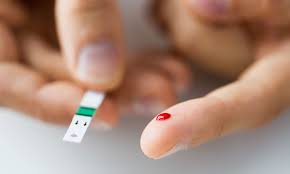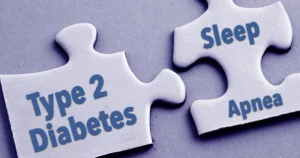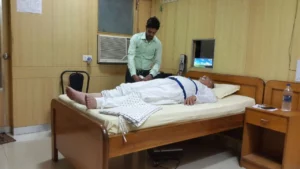If you are one of the people who have diabetes, you know that it can be a difficult condition to manage. But did you know that sleep problems are also common among people with diabetes? In fact, studies have shown that people with diabetes are twice as likely to experience sleep problems as those without the disease. This is a serious issue because poor sleep can lead to all sorts of health problems, including obesity, heart disease, and even diabetes itself. In this blog post, we will discuss the link between diabetes and sleep problems, and we will offer some tips for getting a good night’s sleep.
Contents
What Is Diabetes?

Diabetes is a chronic condition that occurs when the body cannot properly regulate blood sugar levels. There are two main types of diabetes: type I and type II. Type I diabetes, also known as juvenile diabetes, is caused by an autoimmune reaction in which the body attacks and destroys the insulin-producing cells in the pancreas. Type II diabetes, which is much more common, occurs when the body does not produce enough insulin or when the cells do not respond properly to insulin.
Link Between Sleep And Diabetes
There are a few ways in which diabetes and sleep problems are connected. It may be because people with diabetes are more likely to have other health conditions that can cause sleep problems, such as obesity, high blood pressure, and heart disease. In addition, people with diabetes often have to get up during the night to urinate, which can disrupt sleep. Finally, people with diabetes are more likely to experience anxiety and depression, both of which can lead to sleep problems. Or it may be because poor sleep can lead to changes in hormones that increase the risk of developing diabetes.
Whatever the reason, the fact is that people with diabetes are more likely to experience sleep problems than those without the disease.
Sleep Problems With Type 2 Diabetes

There are a few different types of sleep problems that have been linked to type II diabetes. Such as:
- Sleep apnea: This is a condition in which people stop breathing for brief periods during sleep. It can be caused by a variety of things, including obesity, which is common in people with type II diabetes.
- Restless legs syndrome: This is a condition in which people have an irresistible urge to move their legs, often because they feel uncomfortable or itchy. It can make it difficult to fall asleep and stay asleep.
- Periodic limb movement disorder: This is a condition in which people move their legs involuntarily during sleep. It can also make it difficult to get a good night’s rest.
- Peripheral neuropathy: This is a condition in which the nerves are damaged, often as a result of diabetes. It can cause pain, tingling, or numbness in the extremities, which can make it difficult to sleep.
- Insomnia: This is a condition in which people have trouble falling asleep or staying asleep. It can be caused by a variety of things, including stress and anxiety.
All of these conditions can lead to poor sleep, which can then have a negative impact on diabetes control.
Effects
There are a few different ways in which poor sleep can affect diabetes.
- Firstly, It can lead to changes in hormones that make it more difficult to control blood sugar levels.
- In addition, poor sleep can also lead to weight gain, which can then increase the risk of developing type II diabetes.
- Finally, poor sleep can also lead to increased levels of stress and anxiety, which can make it more difficult to manage diabetes.
It also affects our daily life in multiple ways:
- We are more likely to make poor food choices when we are tired.
- We are less likely to exercise when we are tired.
- Being sleep-deprived can lead to you having sleep problems.
- We are more likely to have accidents when we are tired.
- Sleep deprivation can cause cardiovascular problems.
- We are more likely to get sick when we are tired.
- Being sleep-deprived can affect your mood, making you feel on edge.
All of these things can then have a negative impact on diabetes control.
Diagnosis

If you think you might have one of these sleep disorders, it is important to see a doctor. They can order a sleep study, which is a test that is done overnight in a sleep lab. During the study, your breathing, heart rate, and brain waves will be monitored to see if you have a sleep disorder. If any disturbance is noticed in any of these areas, you may be diagnosed with a sleep disorder according to your symptoms.
Treatment
There are a few different ways to treat sleep disorders.
Self-Help

There are a few things you can do on your own to help improve your sleep.
- Try to establish a regular sleep schedule. Go to bed and wake up at the same time every day, even on weekends.
- Create a relaxing bedtime routine. This might include taking a warm bath, reading a book, or stretching.
- Avoid caffeine and alcohol before bed. Both of these substances can interfere with sleep.
- Create a comfortable sleeping environment. Make sure your bedroom is dark, quiet, and comfortable.
- Do not force sleep. If you have trouble falling asleep, try not to get frustrated. Get up and do something else for a while, such as reading or listening to music. Then, try again when you feel tired.
- Avoid screens before bed. The light from TVs, phones, and computers can interfere with sleep.
- Avoid or limit naps. Napping can make it harder to fall asleep at night.
- Get regular exercise. Exercise can help improve sleep. Just be sure not to exercise too much or close to bedtime as it can make it harder to fall asleep.
- Don’t put up with pain. If you have pain that is keeping you awake at night, talk to your doctor.
- Avoid large meals before bed. Eating a big meal can make it hard to fall asleep.
These are just some of the things you can do to try to improve your sleep. If you’re still having trouble sleeping, then trying medical treatment should help.
Professional-Help

If you’ve tried self-help and are still having trouble, then you might need to see a sleep specialist. They can help diagnose and treat sleep disorders.
There are a few different ways to treat sleep disorders.
- Get a sleep study: A sleep study can help your doctor diagnose sleep disorders and figure out the best treatment for you.
- Behavioral therapy: This is a type of therapy that can help you change your behavior and thoughts about sleep. It can also help you learn new ways to sleep better.
- Stimulus control therapy: This is a type of therapy that can help you change your behavior around sleep. It can help you learn to associate your bed with sleep and not with other activities.
- Sleep restriction therapy: This is a type of therapy that limits the amount of time you spend in bed. It can help you learn to sleep only when you’re sleepy and not at other times.
- Cognitive behavioral therapy for insomnia: This is a type of therapy that can help you change your thoughts and behaviors around sleep. It can help you learn new ways to sleep better.
- Counseling: This is a type of therapy that can help you manage stress and anxiety. It can also help you learn new ways to sleep better.
- Support group: support group with other diabetic patients can help feel less lonely.
These are just some of the things you can do to get professional help for your sleep problem. If you’re still having trouble sleeping, it’s important to talk to your doctor so they can help you figure out what’s causing your sleep problems.
Medication

There are several types of medication that can be used to treat sleep disorders.
- Sleep aids: These are medications that can help you fall asleep and stay asleep.
- Wakefulness-promoting agents: These are medications that can help you stay awake during the day.
- Antidepressants: These are medications that can help with depression, anxiety, and other conditions that can cause sleep problems.
- Anti-anxiety medications: These are medications that can help with anxiety and other conditions that can cause sleep problems.
- Stimulants: These are medications that can help you stay awake during the day. These include, but are not limited to, methylphenidate and dextroamphetamine.
- Hypnotics: These are medications that can help you fall asleep.
- Sedatives: These are medications that can help you relax and sleep.
- Psychedelics: These are medications that can help you change your thoughts and behaviors around sleep.
- Anti-convulsants: These are medications that can help with seizure disorders and other conditions that can cause sleep problems.
- Steroids: These are medications that can help with inflammation and other conditions that can cause sleep problems. These include, but are not limited to, prednisone and dexamethasone.
These are just some of the medications that can be used to treat sleep disorders. Your doctor can help you figure out what medication is best for you.
Conclusion
Diabetes put you at risk to develop sleep disorders and sleep disorders put you at risk of worsening your diabetes. Hence, it is important to be aware of the link between diabetes and sleep disorders and to get help if you are having trouble sleeping.
There are many things you can do to get help for your sleep disorder, including getting professional help and taking medication. Don’t forget that you are not alone in this.
Therapy Mantra is the leading provider of mental health services around the globe. With a team of highly qualified and experienced mental health professionals, we are committed to providing the best possible care to our patients. Therapy Mantra is always here to help you improve your quality of life! You may also visit our website to book an online therapy session, Type 1 diabetes treatment, Type 2 diabetes treatment or download our free Android or iOS app for more information.


